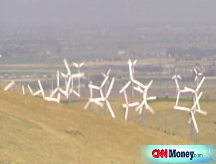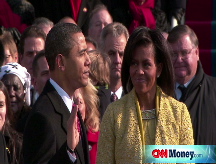Obama, GOP discuss stimulus plan
The president heads to Capitol Hill Tuesday to discuss the $825 billion stimulus plan with House and Senate Republicans.
WASHINGTON (CNN) -- In the first real test of bipartisanship for his new administration, President Barack Obama heads to Capitol Hill Tuesday to discuss his proposed $825 billion economic stimulus plan with congressional Republicans.
The president is scheduled to meet with House Republicans first, followed by a meeting with the Senate GOP caucus. The meetings will be held against the backdrop of what appears to be a steadily deteriorating economic situation, highlighted by thousands of new private sector job cuts announced Monday.
Obama's plan - the American Recovery and Reinvestment Act - has been placed on the congressional fast-track. Key Senate committees are scheduled to debate and vote on the bill Tuesday. The full House may vote as soon as Wednesday.
Democratic leaders have said they aim to get the package to Obama's desk for enactment by Presidents Day.
How much influence the minority GOP will have on the final drafting of the stimulus plan is an open question.
"What we're watching now as the stimulus package takes shape is the legislative equivalent of the first date: Republicans meeting with the new president, sizing him up. Obama deciding whether the GOP is serious about working with him," noted CNN Senior Political Analyst Gloria Borger.
"He [Obama] came to a conclusion early on in his political career that partisan polarization is a large part of the problem," said a senior Obama adviser. "Both in reality and in the minds of the American people."
One key Republican criticism of the stimulus plan is the assertion that many of its provisions would not jolt the economy back to life quickly enough.
The Congressional Budget Office late Monday evening released its first analysis of the total stimulus package as proposed by House Democrats. The CBO estimates that roughly 64% of the $825 billion package would be put to use in 2009 and 2010, assuming a stimulus bill is signed into law in mid-February.
By contrast, Peter Orszag, Obama's budget director, vowed to congressional leaders last week that 75% of the money would be spent within 18 months. The question of just how fast states and other agencies can spend money to do things like fix roads and retrofit buildings to make them more energy efficient will remain central to the congressional debate in coming days.
Appearing before reporters Tuesday morning, House Minority Leader John Boehner, R-Ohio, applauded Obama's planned meeting with congressional Republicans, but reiterated his belief that the bill, as currently drafted, would significantly add to the debt while failing to spark sufficient job creation.
The current version of the bill "won't stimulate anything except more government and more debt," added Indiana Rep. Mike Pence, another member of the House GOP leadership.
Obama will be accompanied to the Hill Tuesday by Transportation Secretary Ray LaHood, a former moderate GOP House member from the president's home state of Illinois. LaHood is expected to play a pivotal role in helping Obama win over at least some congressional Republicans.
Obama also extended an olive branch to Republicans by reportedly helping to remove from the stimulus plan a widely-criticized $200 million provision to provide contraceptives to low-income families.
The provision, which Republican leaders said would do little to help boost the economy, had been strongly defended by House Speaker Nancy Pelosi. ![]()



